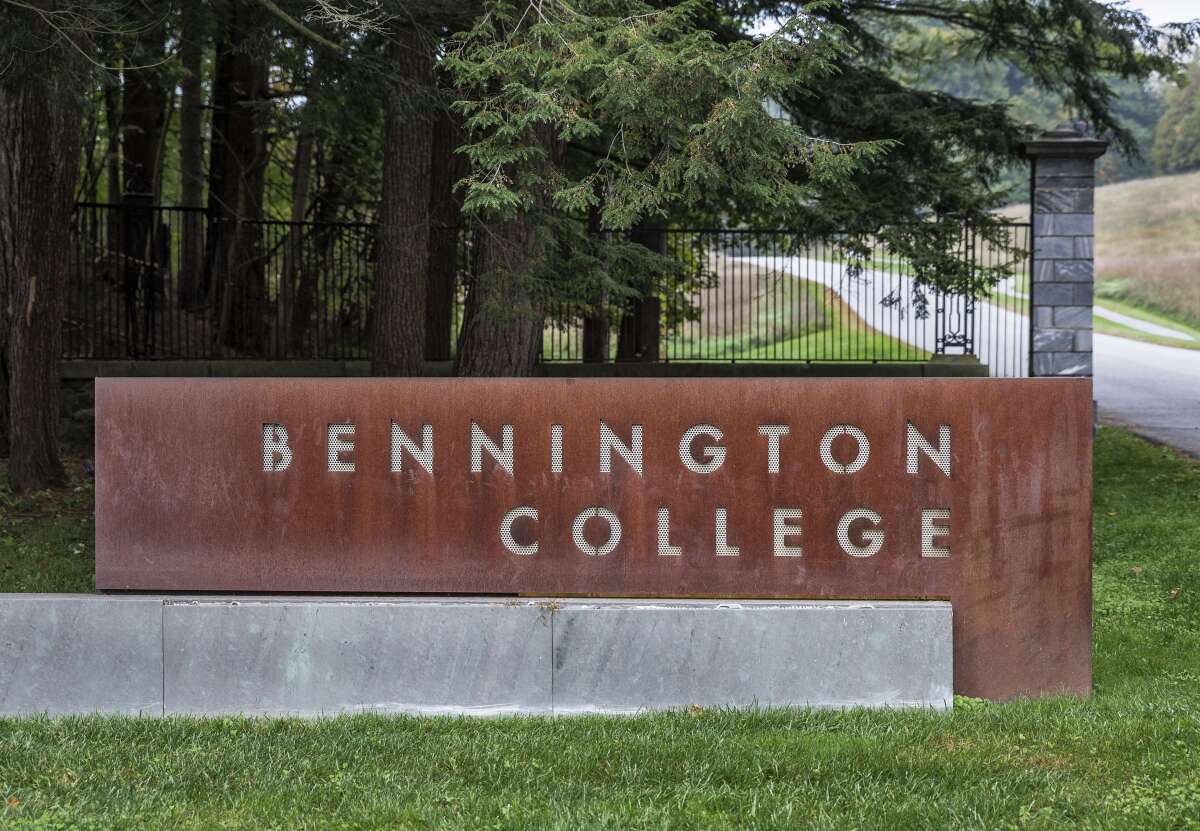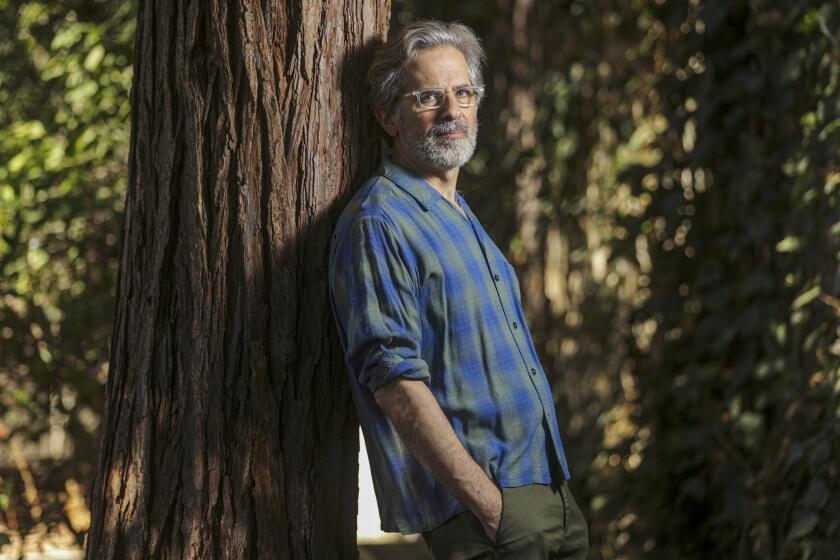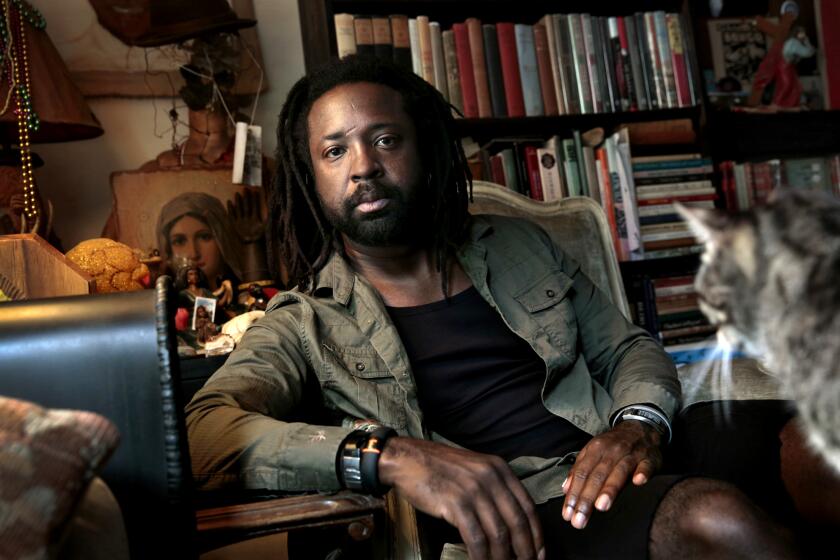How Bennington’s literary brat pack spawned an addictive, L.A.-obsessed podcast
- Share via
Lili Anolik hasn’t spent much of her life at an L.A. address. For about a year after she graduated from Princeton in 2000, she says, she worked at IMG, “like, in the mailroom.” Yet the Vanity Fair journalist has built a career chronicling the lives of famous L.A. cultural figures. Not famous-famous, but not exactly B-listers either: She wrote a memorable 2014 Harper’s essay on troubled West Coast jazz saxophonist Art Pepper and a 2019 quasi-biography of ‘70s scenester-author Eve Babitz, “Hollywood’s Eve.” And she co-hosted a 2020 podcast on scandal-struck porn star Traci Lords, “Once Upon a Time...in the Valley.”
The new sequel to that podcast, “Once Upon a Time...at Bennington College,” claims Sherman Oaks-bred “Less Than Zero” author Bret Easton Ellis as one of its central figures and its key animating force. Produced by C13Originals, the podcast — which finishes its 14-episode run this week — is mainly about literary culture at the Vermont school, which in the ‘80s was infamous for its steep tuition, louche vibe and disregard for formal grades, making it a magnet for both well-heeled ne’er-do-wells and ambitious artsy types who were too eccentric for the Ivies.

Ellis, as it happened, was classmates at Bennington with two other would-be famous novelists, Donna Tartt (“The Secret History”) and Jonathan Lethem (“The Fortress of Solitude”). But Anolik’s close scrutiny of Ellis and “Zero” meant multiple episodes were dedicated to the particulars of L.A.’s malls, clubs, private schools and Hollywood families.
Though Anolik has spent much of her journalistic career fetishistically detailing each of these subjects, over a video call from her home in New York she is initially at a loss to explain what connects them. Eventually she arrives at this conclusion: Ellis, much like those other figures, was declassé (and outright ostracized when his third novel, “American Psycho,” was published in 1991). Art Pepper had a debilitating heroin addiction; Babitz’s books were neglected in their time; Lords, well, worked in porn. So Ellis, for Anolik, is ripe for rediscovery.
“He’s a major writer who’s never won an award,” she says. “There’s something about him that’s disreputable that also keeps him current.”
Author Bret Easton Ellis is no stranger to controversy.
Ellis has done his own bit to maintain that currency: Between the anti-woke riffs in his 2019 essay collection, “White,” and his own podcast, he’s developed a persona as a belletristic Joe Rogan. On the podcast, Anolik positions Ellis as both off-putting (she recalls tossing her copy of “Psycho” in the trash after finishing it) and enchanting, using the icy demeanor he copied from Joan Didion to predict an American MAGA destiny many literary types wished to deny.
More often, though, Anolik cultivates a mood of dishy secret-sharing, in which the novels are less interesting as literary works than as keyholes to the authors’ hidden pasts. She has been on that particular task for years. In 2013 Anolik interviewed Ellis about his work on the script of the movie “The Canyons,” which in turn led to a 2019 oral history of Bennington’s coke-dusted, Brideshead-eque ‘80s lore in Esquire. Though the magazine gave her 14,000 words to work with, she yearned for the sprawl of a podcast, along with a chance to let the players explain themselves in their own voices.
“For me, it was about three writers who had an enormous cultural potency — and trying to figure out what was the source of that potency,” she says. “I think even Bret, who I’ve actually come to know and would consider like a friend, he’s still a mysterious figure to me. It was about watching these people kind of construct their identities and their personas and their careers.” That Lethem is the best-decorated of the group — a MacArthur “genius” grant, an NBCC award — is a kind of detriment in this milieu. His work is the most interesting thing about him.
The podcast has appealed to Gen-Xers who came of age with Ellis, Tartt and Lethem as their best-known — if not best-loved — literary eminences. “It’s ‘Mad Men’ for people our age,” says author and Bennington classmate David Lipsky, who appears on the podcast partly as a key side player (he discouraged Ellis from publishing “Zero,” prompting a rift between them) and partly as a well-positioned critic. “When things are set backwards in time, we think that we had more freedom in some interesting way.”
The novelist perhaps most associated with Brooklyn lives in Claremont and has a delightful new dystopian novel out, “The Arrest”
Anolik notes that the nostalgia cuts across generations. Her inbox and Twitter mentions are filled, she says, with millennials and Gen-Zers who’ve found the lush, isolated campus of “The Secret History” to be the Brideshead of their dreams. (That is, if you subtract the novel’s premeditated homicides.) They also see in Ellis a persona who can laugh off getting ratioed amid a watch-your-step social media culture.
“We’re in this moment of well-meaning repression — social media makes you paranoid about saying the wrong thing,” Anolik says. “We used to look to the future for license to do things, to be more permissive. ... But now people pull up to the past for that looseness.”
That past can be many things, and the podcast offers a sampler: free-partying ‘80s L.A.; Brat Pack-era New York; the Bennington Tartt romanticized in “The Secret History.” But one past was particularly difficult to resurrect. Tartt refused to participate, forcing Anolik to piece together her background through interviews, documents (including letters from her to Lethem) and close attention to Tartt’s audiobook readings. That’s set off a bit of saber-rattling: In October, shortly after the podcast launched, the New York Post reported that Tartt’s lawyers sent letters to Anolik cautioning the podcast against broadcasting false statements or sharing published works or school records without permission.
Anolik declines to speak directly about the legal activity, noting that she stands by what she’s reported in the podcast about Tartt’s Mississippi upbringing and Bennington relationships. But says she was bemused by Tartt’s surveillance of her work. “After the podcast came out, the lawyer letters started to come — Donna’s lawyer, [classmate] Paul McGloin’s lawyer and her publisher’s lawyer. And they were all saying, ‘Just be really careful.’... I took it as a backhanded compliment.”
Donna Tartt’s third novel in more than 20 years is that rare bird: an accomplished work that understands the arbitrariness of life
Anolik says that if she had the opportunity, she’d ask Tartt about the mythology she ended up creating around herself — from her suppression of her Southern roots to the reclusive aura she cultivated following her literary success. “It’s a story about a girl who came from modest beginnings who by virtue of talent, passion, vision and unstinting hard work became one of the great writers of her generation. Except she wishes she had a more romantic backstory,” she says. “Maybe going to Bennington, which was heiress central at the time, you might have wished you had a more glamorous background.”
She isn’t sure yet if there’ll be a third L.A.-themed podcast, or what its subject might be. But Anolik says it’s hard for her to think too far outside the mid-’80s. “It was a time when we had a cultural consensus that we don’t have anymore,” she says. “Writers had advertisements built around them — Apple used Tama Janowitz to sell PowerBooks. They were such glamorous figures that they could be used to sell products. It’s almost like you’re talking about the 1920s. But it’s the ‘80s.”
If the Jazz Age had Fitzgerald and Waugh, the era of coke and Wayfarers had Ellis and Tartt. And now it has Anolik.
Athitakis is a writer in Phoenix and author of “The New Midwest.”
‘Marlon and Jake Read Dead People’ returns for Season 2 with a focus on books that are new to either Marlon James or Jake Morrissey.
More to Read
Sign up for our Book Club newsletter
Get the latest news, events and more from the Los Angeles Times Book Club, and help us get L.A. reading and talking.
You may occasionally receive promotional content from the Los Angeles Times.









